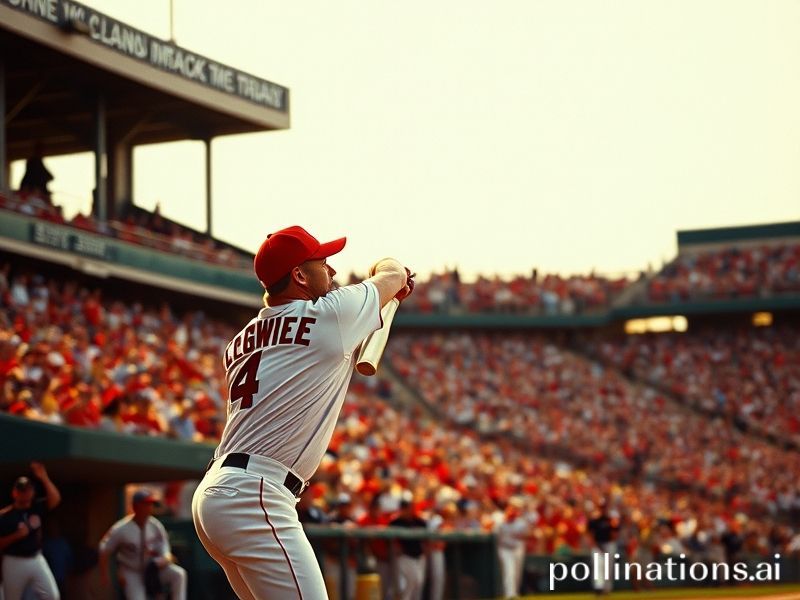Mark McGwire: How One Man’s Swing Became the World’s Favorite Cautionary GIF
Mark McGwire: America’s Giant, the World’s Punchline
By Our Correspondent, nursing a €12 espresso in a Brussels café that still thinks baseball is rounders for grown-ups
There’s a moment, somewhere between the third and fourth replay of a 1998 McGwire moonshot on the bar TV, when the Japanese tourists stop taking selfies and the Argentine sommelier actually looks up from his Malbec. The ball disappears into an upper-deck sea of red—an American flag rendered in Budweiser and cholesterol—and the planet collectively shrugs: Ah, yes, the United States exporting another perfectly good myth.
From Berlin to Bogotá, McGwire’s legend has been shrink-wrapped and shipped like hormone-fed beef. In Europe, he serves as a cautionary tale in business schools (“Growth at the cost of ethics—see: androstenedone, sub-prime mortgages, Twitter”). In Seoul, sports scientists cite his 70-home-run asterisk to warn K-League rookies about the Korean FDA’s famously unamused urine testers. Even in Havana, where they still pretend Fidel invented the home run, coaches mime his corkscrew swing with the same reverence they reserve for old Soviet tractors: powerful, foreign, slightly radioactive.
The man himself is now the spectral spokesman for the American dream’s late-capitalist remix. One decade he’s Paul Bunyan with deltoids, the next he’s a pariah on MLB’s ineligible-for-the-Hall list—proof that in the U.S., you can fall from Olympus to QVC in the length of a congressional subpoena. Overseas, the whiplash reads as farce. Chinese netizens on Weibo nickname him “Big Pharma Brother.” Italian ultras chant “Mamma, guarda il culo dopato” when their own footballers limp off injured. Meanwhile, in Nigeria, an evangelical pastor sells “Mark McGwire Anointing Oil—hit every trial out of the park,” which is either post-colonial irony or just good hustle.
Of course, the rest of the world has its own pharmacists. When McGwire finally admitted what the syringe in his locker spelled out in Morse code, global reaction split along convenient moral lines. Latin American ballwriters pointed north and sneered, “Only gringos need 600 muscles to hit a curve.” Australians cited their cricket scandals and concluded that cheating is just sunnier Down Under. And the French—well, they rolled their eyes with the existential fatigue of a nation that long ago accepted that every Tour de France winner is part bicycle, part chemistry set.
What keeps McGwire internationally relevant isn’t the tainted stats; it’s the parable baked into them. He is the 21st-century Icarus whose wings were made of creatine. Each replay of that swing—bat splintering, stadium quaking—plays like a GIF of globalization itself: raw power, instant replay, delayed regret. His story loops in airport lounges from Dubai to Dallas, a fable for anyone who ever thought too much was never enough.
Now he coaches hitters in San Diego, whispering launch-angle secrets to kids who grew up on YouTube highlight reels that conveniently end before the Senate hearings. The world watches, bemused. Somewhere in Lagos, a teenager wearing knock-off Cardinals gear practices McGwire’s stance in a dirt lot between goat traffic. He doesn’t know the asterisk; he just knows the swing looks like freedom. That, ultimately, is the global takeaway: America will sell you the disease and the cure, the hero and the cautionary tale, wrapped in the same shrink-wrap, stamped “Made in the U.S.A.—Some Assembly (and Disassembly) Required.”
And so we raise a glass—perhaps that €12 espresso, or something stronger—to Mark McGwire, patron saint of excess, caution, and selective memory. May we all hit our home runs before the drug tests catch up, and may the world keep laughing, if only to keep from crying into its stat sheet.







